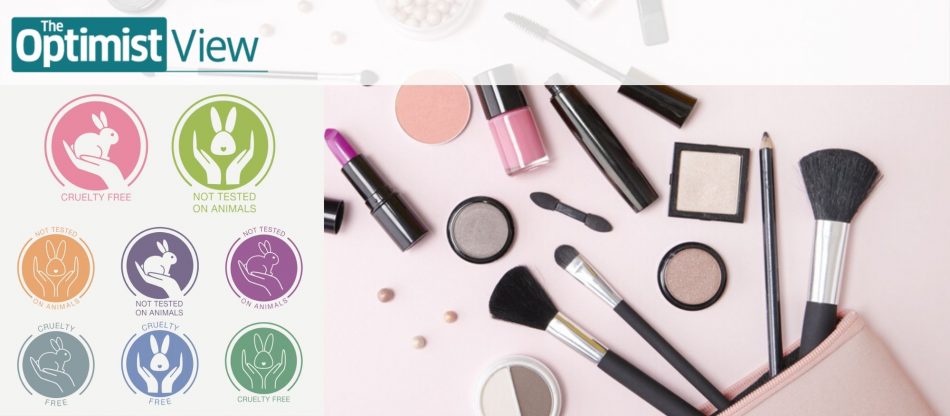“Cruelty-free is becoming the standard. Not just in California, in general.” – Katie Mukai
BY LAUREN GOODMAN
A couple of weeks ago, you may have seen an Optimist Daily story in your inbox about a proposed California bill that would ban the use of twelve ingredients in cosmetics. This Toxic-Free Cosmetics Act (AB 2762) would make cosmetic products safer for human use. And, not to mention, it would give us peace of mind in buying our products without carefully scanning every single ingredient label. This bill is now on its way to the Senate and will hopefully go into effect soon.
While it’s important for consumers like you and me to be aware of the ingredients– specifically the toxins– we’re putting on our body, it’s also important that other parties involved stay safe as well.
What am I talking about? Well, historically and even currently, animals are used to ensure the safety of products before they are sold for human use. As you may know or have likely thought about, animal testing is inhumane. Some products on the shelves now have certain labels like “cruelty-free” or “not tested on animals,” but soon enough, that will be the norm.
In 2018, the state of California passed the California Cruelty-Free Cosmetics Act to go into place beginning January 1st, 2020. That’s six months ago! California became the first state in the United States to have this type of ban on animal experimentation in the cosmetic industry. (**Disclaimer: Not all cosmetics sold in California are cruelty-free yet. There are certain provisions of the bill text that allow a period of time to phase out animal testing, and there are certain loopholes for abiding with foreign regulation.)
Now, I like to deem myself somewhat of an expert on this piece of legislation because I dedicated nine months and a hefty chunk of my university research studying it. As an independent research project, I dedicated my heart and soul to studying the California Cruelty-Free Cosmetics Act in what culminated in a 95-page senior thesis. To say I’m proud is an understatement. To say I will use this knowledge to educate others and better understand industry responses to environmental regulation is just the beginning.
Regulations are important, but so are the actions of specific companies. These industry leaders set the tone for how a law is adopted and what significant changes are made to embrace more ethical standards.
 I narrowed in this broad topic by analyzing market reactions to the regulation leading up to and upon the implementation of the bill. By looking at nine major companies (L’Oréal, Procter and Gamble, Estée Lauder, Mary Kay, Unilever, Coty, Beiersdorf, e.l.f., and Pacifica) that manufacture in the US, I was able to piece together their portfolios of 124 brands that are sold in California. It gets a little confusing here. For example, L’Oréal the company owns 31 different brands that are sold in the US.
I narrowed in this broad topic by analyzing market reactions to the regulation leading up to and upon the implementation of the bill. By looking at nine major companies (L’Oréal, Procter and Gamble, Estée Lauder, Mary Kay, Unilever, Coty, Beiersdorf, e.l.f., and Pacifica) that manufacture in the US, I was able to piece together their portfolios of 124 brands that are sold in California. It gets a little confusing here. For example, L’Oréal the company owns 31 different brands that are sold in the US.
I’ll spare you the research details and information-dense graphs, but the gist of my research design was studying evolving brand portfolios from 2000 through 2019. I also performed several interviews with activists, lobbyists, bill sponsors, legislators, and brand executives to get a better understanding of the legislation and its effects on businesses.
I determined that there has, in most cases, been an increasing number of cruelty-free brands in each companies’ individual portfolio. There was a definite spike around 2018 when the California Cruelty-Free Cosmetics Act was signed by Governor Jerry Brown, and it seems as though companies are feeling the pressure to change their ways.
When companies themselves decide to take action, it’s a positive sign the industry is shifting.
While this is monumental for the US, plenty of other countries have already been regulating or totally forbidding animal testing on cosmetic products. California joins the list of places including the United Kingdom, all of the European Union, Israel, New Zealand, Australia, and more.
One of the main conclusions of my research is that other states tend to follow California’s progressive actions. According to Katie Mukai, a Product Developer at makeup brand Urban Decay, “Cruelty-free is becoming the standard. Not just in California, in general.” She noted that this legislation has set the standard to create products that are not tested on animals. Because California has realized the language of the regulation, other states are able to use its progressive lead as a starting point of their own change. In fact, Nevada has enacted a similar piece of legislation and New York is working on one as well. I predict that in a few years from now, we’ll be seeing this type of regulation in almost all states if not at the federal level.
This research goes to show that businesses (in this case, cosmetic companies) can really make a difference. By changing their ways, they actively reduce animal cruelty. Moreover, this research explains that regulation is important, especially environmental regulation. It’s so critical for businesses to take responsibility, but sometimes they won’t do that unless they’re forced to by law.
But how did we get to this point? It wasn’t without the tireless work of advocates.

Activists, this one’s for you. Don’t stop speaking up for what you believe in. The only way we’re going to see change is if people like us raise our voices and demand certain regulatory changes. According to Elizabeth Baker, Pharmaceutical Program Policy Director at Physicians Committee for Responsible Medicine (a co-sponsor of the bill), “You have the public evolving, poll after poll showing that people overwhelmingly do not support animal testing for cosmetics, polls demonstrating that not testing on animals is the most important packaging claim to consumers across all age groups.” This pressure has led to an increase of research surrounding non-animal testing technologies as well as an increase of cruelty-free items on shelves.
Legislation like this has impacts that reach further than the cosmetic industry. The cosmetics industry is a $532 billion enterprise and highly influential. Soon enough, we’ll be seeing a more widespread understanding of and dedication to animal and environmental welfare by normalizing it through this industry as a starting point. For example, animal testing is still prevalent in the medical industry, and will likely remain that way for a while.
While the cosmetic industry may have been the “easy” first step, some of the same activists are now working across other industries to end animal testing. Monica Engebretson, Head of Public Affairs North America at Cruelty Free International, explained:
“We want to harmonize the regulations, not just move animal testing around— we want to phase it out. These alternatives have been largely developed because of the push for cruelty-free cosmetics— these same alternatives often have applications in other areas of science, including medicines and other things, so there’s this knockoff effect that benefits from developing more accurate and more humane methods.”
Interviews with experts from different fields collectively indicate that SB 1249 has already had and will continue to have an impact in the cosmetic industry. From several conversations, it is clear that California holds great legislative power, and although there are hurdles in creating new regulations there are many factors that push this process.
Certain pressures, such as consumer values, push companies toward cruelty-free acquisitions and transitions to keep up with consumer preferences. Because of the multiple available alternative testing methods, companies have the opportunity to eliminate animal testing. The California Cruelty-Free Cosmetics Act is a huge step forward in paving the way for similar legislation to come, as well as creating a chain reaction of similar effects both in other industries and in the cosmetic industry across the US and eventually in places like China where the regulation is quite opposite.
This research really began as a passion project. I was looking for ways to study animal welfare and landed on the idea of regulation in business. I found that while this legislation may be far from perfect, it’s a start. And it’s a massive step forward for the US and for the animal rights movement. The beauty industry has so much power to drive change.
I urge businesses to take responsibility for their practices and environmental and social impacts, and I commend activists for never giving up. I am optimistic about these trends. Hopefully, in the near future, we won’t have to worry about toxic ingredients in our products or the ways that those ingredients got there.
If you’re looking to make your own beauty routine more ethical, check out this list of cruelty-free brands!

About the Author:
 Lauren Goodman is a Contributing Writer for the Optimist Daily and serves as Communications Coordinator at the World Business Academy. With a background in environmental science, she is very passionate about animal and environmental welfare, advocating to raise awareness about extreme issues that are prevalent in our everyday lives.
Lauren Goodman is a Contributing Writer for the Optimist Daily and serves as Communications Coordinator at the World Business Academy. With a background in environmental science, she is very passionate about animal and environmental welfare, advocating to raise awareness about extreme issues that are prevalent in our everyday lives.











